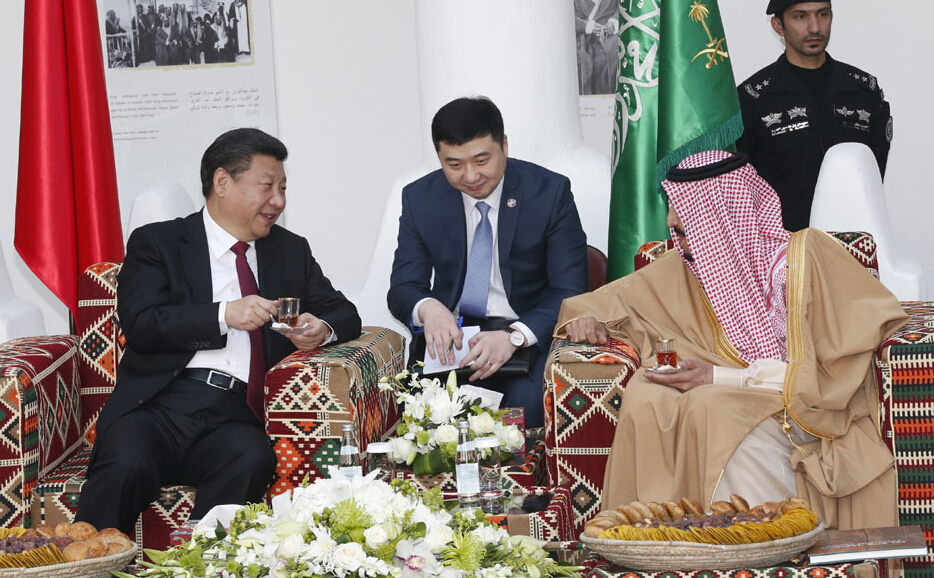China vows to contribute to Middle East stability
- By Han Fangming
 0 Comment(s)
0 Comment(s) Print
Print E-mail China.org.cn, January 21, 2016
E-mail China.org.cn, January 21, 2016
|
|
|
Chinese President Xi Jinping has a taste of traditional Arab culture Wednesday as he visits the historic Murabba' Palace in Riyadh. [Photo/Xinhua] |
Chinese President Xi Jinping arrived in Saudi Arabia on Jan. 19 to begin his state visit to the three nations of Saudi Arabia, Egypt and Iran in the Middle East. This is Xi's first overseas visit this year, which not only shows the close relations between China and these countries, but is also manifest of China's attitude toward helping create an atmosphere of peace in the Middle East.
Saudi Arabia is China's biggest trade partner in Western Asia and Africa, and also the biggest supplier of crude oil. Egypt is the first country that established diplomatic relations with China among the Arabian countries in Africa. Iran is an important country for Chinese investment and a cooperative partner in the Middle East.
All the three countries are great powers in that region. However, after the "Arab Spring," the political situation in Egypt became unstable. On Jan. 4, Saudi Arabia cut off diplomatic relations with Iran, which exacerbated the crisis in the region.
President Xi's visit showcases the friendly relations between China and the Arab region. China's long-term policy, which features mutual respect and non-interference in others' internal affairs, seems to have made Chinese suggestions very welcome among the nations in the region.
A range of opinions regarding the suppositions that China wants to mediate the Saudi-Iran conflict, that China is not resigned to playing a supporting role in the Middle East, and that China is taking a risk appeared in some Western media reports.
These points of view are exaggerated. China has always attached great importance to the Middle East. Xi's visit to the region is aimed at meeting the needs of bilateral relations. Meanwhile, China is a responsible country and would like to promote dialogue and understanding towards peace in the region.
China doesn't want to intervene unilaterally in other country's affairs. Instead, China is willing to listen to all viewpoints and perspectives before playing a unique role based on fairness.
Before Xi's visit, the Chinese government released "China's Arab Policy Paper" on Jan. 13 via the Xinhua news agency to guide its diplomatic approach towards Arab countries. This is the first Arab policy paper from the Chinese government, which can serve as both a topic for high level talks and a criterion for reviewing the ongoing state visit.
The Paper highlights two points. First, China is hoping to deepen economic cooperation based on the "Belt and Road" Initiative. Second, the country seeks to help with regional security and stability, and strengthen anti-terror cooperation in the Middle East. These are also the key targets of Xi's state visit.
Saudi Arabia, Egypt and Iran have their own unique characteristics. China will develop specific relations and encourage targeted cooperation with different countries. President Xi's visit will not only be beneficial to China-Arab relations, but also contribute to regional stability in the Middle East.
The writer is deputy director of the Foreign Affairs Committee of the Chinese People's Political Consultative Conference (CPPCC) and chairman of The Charhar Institute.
The article was first published in Chinese and translated by Lin Liyao.
Opinion articles reflect the views of their authors only, not necessarily those of China.org.cn.







Go to Forum >>0 Comment(s)